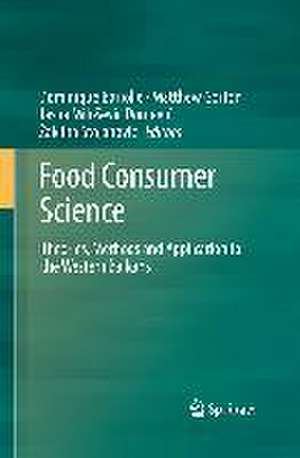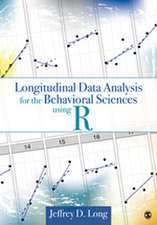Food Consumer Science: Theories, Methods and Application to the Western Balkans
Editat de Dominique Barjolle, Matthew Gorton, Jasna Milošević Đorđević, Žaklina Stojanovićen Limba Engleză Paperback – 12 apr 2015
| Toate formatele și edițiile | Preț | Express |
|---|---|---|
| Paperback (1) | 549.33 lei 38-45 zile | |
| SPRINGER NETHERLANDS – 12 apr 2015 | 549.33 lei 38-45 zile | |
| Hardback (1) | 639.25 lei 6-8 săpt. | |
| SPRINGER NETHERLANDS – 4 apr 2013 | 639.25 lei 6-8 săpt. |
Preț: 549.33 lei
Preț vechi: 686.66 lei
-20% Nou
Puncte Express: 824
Preț estimativ în valută:
105.13€ • 108.92$ • 87.74£
105.13€ • 108.92$ • 87.74£
Carte tipărită la comandă
Livrare economică 17-24 martie
Preluare comenzi: 021 569.72.76
Specificații
ISBN-13: 9789401780537
ISBN-10: 9401780536
Pagini: 160
Ilustrații: XVI, 144 p.
Dimensiuni: 155 x 235 x 8 mm
Greutate: 0.24 kg
Ediția:2013
Editura: SPRINGER NETHERLANDS
Colecția Springer
Locul publicării:Dordrecht, Netherlands
ISBN-10: 9401780536
Pagini: 160
Ilustrații: XVI, 144 p.
Dimensiuni: 155 x 235 x 8 mm
Greutate: 0.24 kg
Ediția:2013
Editura: SPRINGER NETHERLANDS
Colecția Springer
Locul publicării:Dordrecht, Netherlands
Public țintă
Upper undergraduateCuprins
1 Introduction.- 2 Theories of Food Choice.- 3 Quantitative Surveys of Food Consumption and Motives: The Food Choice Questionnaire (FCQ) .- 4 Segmenting Consumers Using Cluster Analysis: An Application to Food Motivations in the Western Balkan Countries.- 5 Exploring an Emerging Market Through Focus-Groups and Expert Interviews: Health Claim Products in the Western Balkans.- 6 Assessing Fruit Perception Using Focus Groups.- 7 Harnessing Expert Opinion: Trends and Challenges on the Balkan Organic Market, Based on a Delphi-Approach.- 8 Utilising Conjoint Analysis: Understanding Consumers Preferences for Traditional Food.- 9 Conclusions.- Index.
Textul de pe ultima copertă
This book explores the main methods, models, and approaches of food consumer science applied to six countries of the Western Balkans, illustrating each of these methods with concrete case studies. Research conducted between 2008 and 2011 in the course of the FOCUS-BALKANS project forms an excellent database for exploring recent changes and trends in food consumption.
Each chapter of Food Consumer Science: Theories, Methods and Application to the Western Balkans includes an introduction, an explanation of the methodology applied and illustrations with a case study. Coverage includes such topics as theories of food choice; segmenting consumers using cluster analysis; the emerging market for health claim products; the use of focus groups for assessing fruit perceptions; methods for analyzing consumer interest in organic and traditional foods and more.
A final chapter offers conclusions concerning the major evolving markets for health claim products, fruits, organic products and traditional food and presents findings on food choices of Western Balkan consumers. The book declares an urgent need for development of consumer rights and of public health policies, which must be supported by a Europe-wide network of scientists and public health officials.
Each chapter of Food Consumer Science: Theories, Methods and Application to the Western Balkans includes an introduction, an explanation of the methodology applied and illustrations with a case study. Coverage includes such topics as theories of food choice; segmenting consumers using cluster analysis; the emerging market for health claim products; the use of focus groups for assessing fruit perceptions; methods for analyzing consumer interest in organic and traditional foods and more.
A final chapter offers conclusions concerning the major evolving markets for health claim products, fruits, organic products and traditional food and presents findings on food choices of Western Balkan consumers. The book declares an urgent need for development of consumer rights and of public health policies, which must be supported by a Europe-wide network of scientists and public health officials.
Caracteristici
Based on research conducted in the course of the FOCUS-BALKANS project Explains the main methods, models, and approaches of food consumer science in a concise and simple way Illustrates each method, using a concrete case study Shows that food consumer science is an ever-more important discipline in the light of growing challenges in public health














